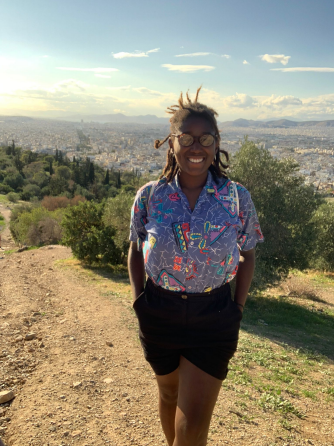Symiah Barnett
ECG Bulletin January 2023
Symiah completed her undergraduate degree in Applied Chemistry at Aston university in June 2021. As of October 2021, Symiah is a Natural Environment Research Council (NERC) funded PhD student at Loughborough University. Her project is focussed on monitoring microplastics and nanoplastics in rivers and marine environments over long time periods to better understand their formation, transportation, and fate.
What inspired you to become a scientist?
As a child I had lots of questions and I remember my science classes providing a lot of the answers. Science appeared as a way of understanding the world around me. There is nothing that you can look at that you cannot explain or explore via science, and I have been able to learn a lot more about the world throughout the course of my chemistry degree.
What inspired you to become a scientist?
As a child I had lots of questions and I remember my science classes providing a lot of the answers. Science appeared as a way of understanding the world around me. There is nothing that you can look at that you cannot explain or explore via science, and I have been able to learn a lot more about the world throughout the course of my chemistry degree.
|
How did you come to specialise in plastic pollution?
During my undergraduate degree, I completed a summer placement at the Archipelagos Institute of Marine Conservation in Greece. This is where I discovered that I wanted to tackle the environmental problem of microplastics in water. I loved the idea of continuing research in microplastic pollution; therefore, I started my research project at both Archipelagos Institute of Marine Conservation and Loughborough University, working on microplastics and nanoplastics in rivers and marine environments. Could you describe your current job? My project is multi-disciplinary, which requires me to carry out a vast range of tasks such as analysing samples using a variety of techniques (e.g. FTIR, ICP-MS and GS-MS). There is kayaking, freediving and scuba-diving to collect samples. Or sitting in front of a computer screen searching for articles or data. No day or week is the same for me. |
What advice would you give to anyone considering a career in environmental chemistry?
Create and take every opportunity possible because you don’t know where it will lead you. But more importantly, believe in yourself.
What are some of the challenges facing the environmental chemistry community?Not enough listening amongst people. Whether that is the scientist not being listened to by governments and organisations, or local groups and communities not being heard by scientists. There is an overall lack of understanding and collaboration.
What is the most rewarding aspect of your career so far?Whilst carrying out fieldwork in Samos (Greece), the local people came over to us and thanked us dearly. This had to be the most rewarding moment because it was at that moment I realised our work was making a difference to the local community.
If you weren’t a scientist, what would you do?
I would be a Humanitarian aid worker because I really enjoy helping people and making a positive difference. Additionally, I love working around the world.
And what do you do when you are not working?
When I am not working, I am traveling! Most of the time I have to travel locally. But when I have a lot of time off, I enjoy backpacking across countries. My aim is to visit every country in Europe and Southern and Central America. And if I am not travelling, I am sleeping!
Create and take every opportunity possible because you don’t know where it will lead you. But more importantly, believe in yourself.
What are some of the challenges facing the environmental chemistry community?Not enough listening amongst people. Whether that is the scientist not being listened to by governments and organisations, or local groups and communities not being heard by scientists. There is an overall lack of understanding and collaboration.
What is the most rewarding aspect of your career so far?Whilst carrying out fieldwork in Samos (Greece), the local people came over to us and thanked us dearly. This had to be the most rewarding moment because it was at that moment I realised our work was making a difference to the local community.
If you weren’t a scientist, what would you do?
I would be a Humanitarian aid worker because I really enjoy helping people and making a positive difference. Additionally, I love working around the world.
And what do you do when you are not working?
When I am not working, I am traveling! Most of the time I have to travel locally. But when I have a lot of time off, I enjoy backpacking across countries. My aim is to visit every country in Europe and Southern and Central America. And if I am not travelling, I am sleeping!


